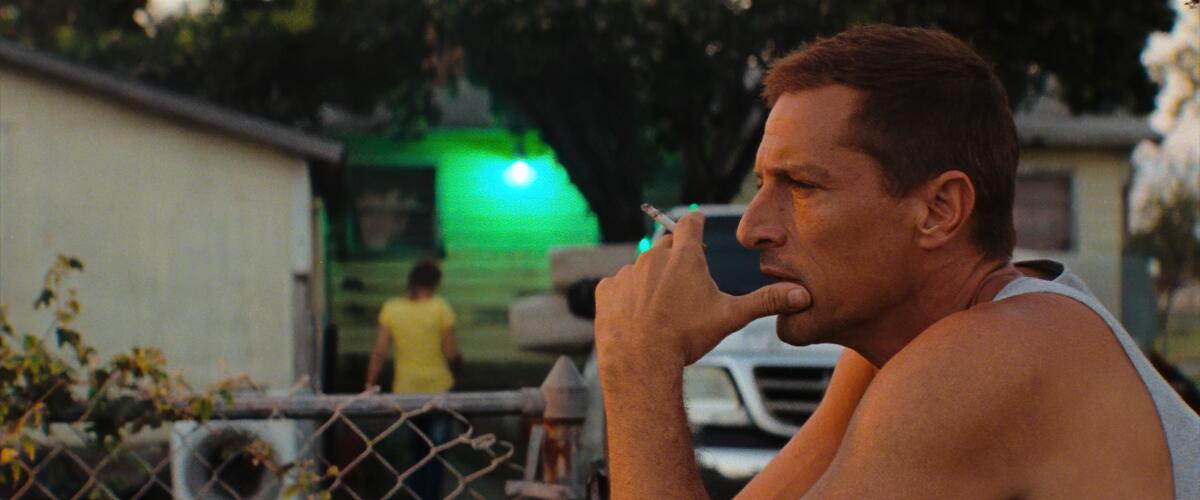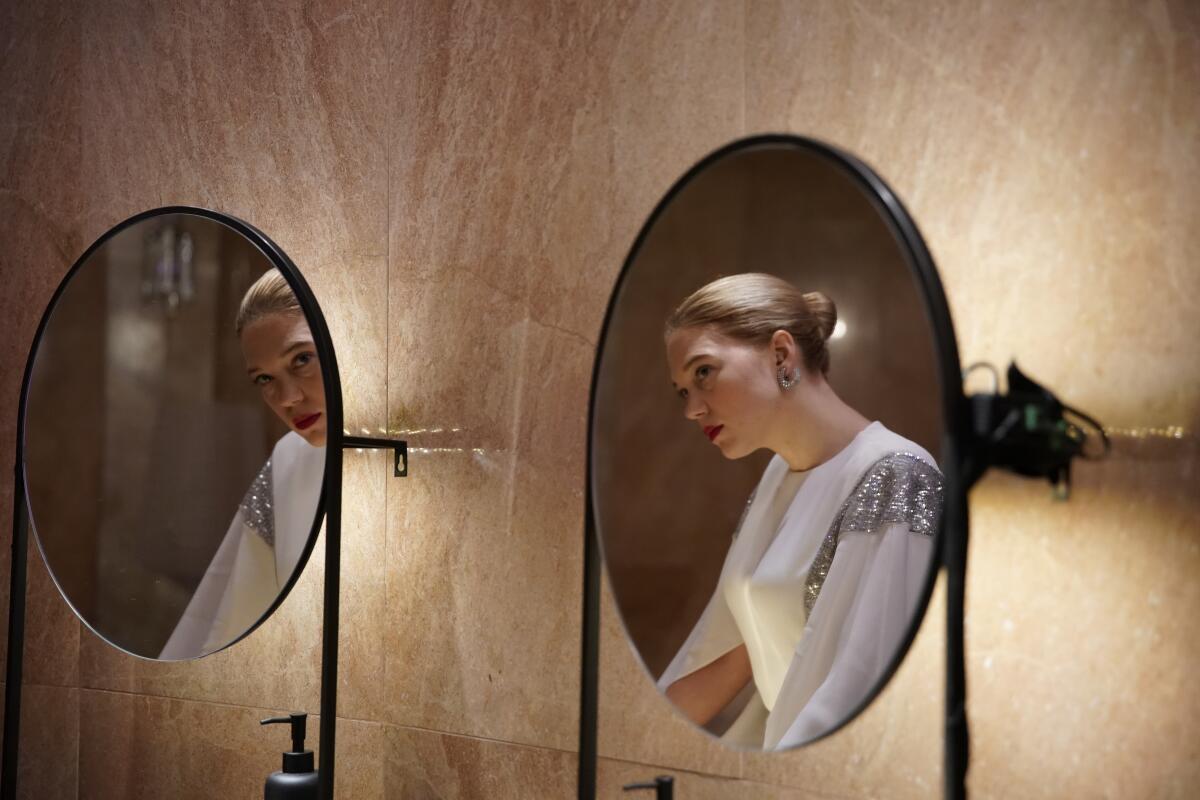Sean Baker and Simon Rex launch their ‘Red Rocket’
- Share via
Hello! I’m Mark Olsen. Welcome to another edition of your regular field guide to a world of Only Good Movies.
Only good movies
Get the Indie Focus newsletter, Mark Olsen's weekly guide to the world of cinema.
You may occasionally receive promotional content from the Los Angeles Times.
We begin this week by paying our respects to Italian filmmaker Lina Wertmüller, who died Thursday in Rome at age 93. Wertmüller was the first woman ever nominated for the Academy Award for best director, for her 1975 film “Seven Beauties,” and she received an honorary Oscar in 2019. Among those paying tribute were filmmakers Allison Anders and Nancy Meyers.
One of the most anticipated films of this year — and last year too, since the release was pushed back due to the pandemic — is undoubtedly the new version of “West Side Story” directed by Steven Spielberg and adapted by playwright and screenwriter Tony Kushner. That the musical’s original lyricist, Stephen Sondheim, died recently makes the occasion all the more poignant. The reviews for the new film have been largely positive, which — for a film many initially questioned the need for in the first place — has made the release feel especially triumphant.
As Justin Chang wrote in his review of the film, “Directing a musical — and a version of a musical he’s loved since childhood — has shaken something loose in Spielberg. Why ‘West Side Story,’ why now? To watch this movie is to see and hear the answer. … Spielberg’s movie may be rougher, grittier, more lived-in and, in terms of cultural representation, more truthful than its 1961 cinematic incarnation. But it is also more unabashedly classical, more radiantly stylized, than just about anything a major American studio has released in years.”
Greg Braxton examined five key differences between the original film and its new remake.
The Sundance Film Festival released its 2022 program announcement this week, with a plan for both virtual and in-person events. I spoke to a number of filmmakers with work in the program as well as some of the festival’s organizers. As the festival’s director of programming Kim Yutani said, “A lot of the films we saw this year were made under what we know were challenging circumstances. And I think that you can tell that in the work itself. I think you are seeing things that are addressing the very real issues that we’ve all experienced, around grief and loss, loneliness and isolation and also calling into question institutions and pushing back against them.”
On Saturday, the UCLA Film & Television Archive will show 1999’s “But I’m a Cheerleader,” with director Jamie Babbit in person. The film is a satiric comedy of conversion therapy that has been described as a gay “Clueless” and has a cast that includes Natasha Lyonne, Clea DuVall, Melanie Lynskey, RuPaul, Bud Cort and Mink Stole. Babbit has gone on to a notable career directing television, including multiple episodes of the recent hit series “Only Murders in the Building.” Saturday night’s program also includes Babbit’s 2001 short, “Stuck.”
This week on the Envelope podcast, co-host Yvonne Villarreal interviewed Jennifer Coolidge about her career, her role in creator Mike White’s recent series “White Lotus” and more. Regarding where things ended for her character in Season 1, Coolidge said, “You know, Mike White. I remember saying, ‘Do you have to do that, Mike? Do you really have to do that?’ And Mike said, ‘Jennifer, I’m not writing a fairy tale, I’m writing reality.’”
Subscribe wherever you get your podcasts.
We also have a virtual Indie Focus screening event for the movie “Jockey.” From Dec. 11 to 13, you can stream the film and watch a pre-taped Q&A with director Clint Bentley, his co-writer Greg Kwedar and actors Molly Parker and Clifton Collins Jr.
Enjoying this newsletter? Consider subscribing to the Los Angeles Times
Your support helps us deliver the news that matters most. Become a subscriber.
‘Red Rocket’
Sean Baker has long been a favorite filmmaker around these parts, and his new “Red Rocket” tells the story of a flamed-out former porn star named Mikey Saber (Simon Rex) who returns to his small Texas hometown as a last resort. While living with his estranged wife and her mother (Bree Elrod, Brenda Deiss), he meets a 17-year-old girl who goes by the name Strawberry (Suzanna Son) and becomes convinced she could be his ticket back to Los Angeles. The film is in theaters now.
For The Times, Justin Chang wrote, “‘Red Rocket’ is both a laser-focused character study and a scrappy, scrupulously observed portrait of a tight-knit community. … [The film] diagnoses what might be described as a condition of permanent, willed stuntedness, a state of emotional, intellectual and moral vacuity that — as sharply and specifically as Mikey embodies it — may not belong to him alone. … Does it make “Red Rocket” a red-state X-ray — a portrait of the ignorance, rage and sense of futility that made great swaths of the American working class susceptible to the machinations of a washed-up celebrity? Baker is too generous and big-hearted a filmmaker to subscribe completely to this interpretation.”
Josh Rottenberg spoke to Son about her breakthrough part for a story publishing soon. Of the film’s off-balance relationship between the 40-something Mikey and the 17-year-old Strawberry, Son said, “She owns it, that’s for sure. She is always two steps ahead of Mikey. He is the naive one who’s sort of put Strawberry in this box of what he thinks she is, but she’s so much more than that. She’s quietly focused, quietly calculated. That’s what’s beautiful about it: all her hope.”
Jen Yamato is working on a story focused on the movie’s use of the ’N Sync song “Bye Bye Bye.” As Baker said to her of the film’s focus on Mikey, “I’m putting this antihero out there and exploring the moral gray on purpose because … I know that staying ambiguous, staying neutral on a subject that one normally wouldn’t stay neutral on, especially in today’s world, in 2021, can be risky. And definitely you can alienate some audiences. I get it, but I’m not making a lowest common denominator blockbuster movie here. Simple as that. I’m not really interested in pleasing everybody.”
For the New York Times, A.O. Scott compared the film to Baker’s previous films such as “Starlet,” “Tangerine” and “The Florida Project” by saying, “‘Red Rocket,’ the nonjudgmental portrait of a narcissistic predator, is a rougher piece of work. It’s funny and abrasive, but also coy and, in the end, a bit tedious. … Maybe Mikey just isn’t that interesting. He may have made a name for himself via three-minute clips on the internet, but more than two hours in his company is a lot to endure.”
For Little White Lies, Hannah Strong wrote, “‘Red Rocket’ feels a little lighter in tone than Baker’s previous work, and as such doesn’t quite have the emotional resonance that we’ve come to expect since his star began to rise. … Still, there are some truly riotous moments, and as a character study on how one man’s awfulness permeates across everyone he meets, this is fascinating stuff.”
For Rolling Stone, David Fear wrote, “Rex, however, knows how to play up the appeal of this former golden boy without winking to the audience or making you feel pity for him. Instead, he draws you in, backslapping viewers even as we shake our heads. His Saber is one part cute-but-always-pissing-on-the-floor puppy dog, one part carnival barker, and a whole lot of amiable sleaze. The way he plays against the cast of mostly first-timers and locals — another Baker specialty — feels completely in tune with the movie’s loose, let-it-flow vibe. “

‘Don’t Look Up’
Written and directed by Adam McKay, “Don’t Look Up” is a star-studded disaster movie and a satirical allegory for climate change, the pandemic response and the general failure of communication in modern life. In the film, two scientists (Leonardo DiCaprio and Jennifer Lawrence) discover a giant comet that will crash into Earth in six months and struggle to get anyone to do anything about it. The cast also includes Meryl Streep, Jonah Hill, Cate Blanchett, Tyler Perry, Ariana Grande and many more. The film is in theaters now and begins streaming Dec. 24 on Netflix.
McKay will actually be our guest on next week’s episode of The Envelope podcast, so stay tuned for that conversation.
For The Times, Justin Chang wrote, “Watching ‘Don’t Look Up,’ with its mix of occasional big laughs (the Ariana Grande number legitimately slays) and scattershot non sequiturs, I couldn’t help but fear for the long-term viability of the Hollywood media-political satire as a genre. Nothing about the foolishness and outrageousness of what the movie shows us — no matter how virtuosically sliced and diced by McKay’s characteristically jittery editor, Hank Corwin — can really compete with the horrors of our real-world American idiocracy. (But speaking of which: Would it have killed the movie to define the world as something bigger than the U.S. of A.?)”
For the Washington Post, Ann Hornaday wrote, “‘Don’t Look Up’ bristles with the combustible elements of absurdity, observational humor and seething outrage that give the best political satires their edge: Here, the comet is a fitting metaphor for climate change, the covid pandemic or any number of threats that, because of hyperpolarization and a dumbed-down populace, alarming numbers of Americans choose to ignore. President Orlean’s political affiliation is never explicitly stated, but her signature gimme cap and son-slash-chief of staff (played with bratty bro-tastic contempt by Jonah Hill) bear the unmistakable whiff of the Former Guy. Still, ‘Don’t Look Up’ is less interested in shooting fish in a partisan barrel than exploring the vagaries of human nature — at their most infuriating, inexplicable and, sometimes, disarmingly endearing.”
For Vanity Fair, Richard Lawson wrote, “As subject matter, it’s entirely necessary. There has been a curious dearth of movies that look intently at climate change, so McKay’s intentions are noble. But as he did with ‘The Big Short’ and ‘Vice,’ McKay lacquers ‘Don’t Look Up’ with an impenetrable layer of smugness. Whatever broadly worthy message the movie has is drowned out by a parade of movie-star mugging and stale pop culture jokes. The tricky thing about satire is that it’s really tricky. The skewering has to be surgically precise to work, and precision is not a mode McKay seems capable of.”
For Inverse, Robert Daniels wrote, “‘Don’t Look Up’ finds genuine ground when tapping into a real human element. The film’s ending, a somber flourish, is surprisingly measured. A gathering of family and friends, trading mundane memories, trying to muster up some small talk to quell the oncoming fear, does more to connect this film to the pandemic than any joke or lampoon ever could. That poignancy sets this film apart from ‘The Big Short’ and ‘Vice’ because it’s not simply a regurgitation of terrible events and even worse people.”

‘France’
In “France,” written and directed by Bruno Dumont, Léa Seydoux plays France de Meurs, a successful TV journalist who suffers a crisis of conscience after she accidentally knocks an immigrant delivery man off his scooter. Her seemingly perfect life quickly unravels. The movie is playing at the Nuart Theatre in Los Angeles.
For The Times, I reviewed the film, writing, “The film captures behind-the-scenes media drama in a much better fashion than the American streaming series ‘The Morning Show.’ Seydoux brings a vulnerability to the role even when the character is at her most monstrous. In part because of the depth of Seydoux’s performance, the film becomes less an allegory of a nation and more a gripping character study, a portrait of a mask of personal and professional regard slowly slipping away.”
For the New York Times, A.O. Scott wrote, “While France remains interesting, thanks to Seydoux’s tough and resourceful performance, ‘France’ loses its emotional force and its intellectual focus. A potentially insightful exploration of the loss of self in a media-saturated world amounts, in the end, to a series of shallow images.”
For the Playlist, Elena Lazic wrote, “France also appears to stand, indeed, for the country itself. Phonetically, her full name sounds like ‘France demeure,’ meaning ‘France remains,’ and although the character goes through the wringer, she always gets back on her feet — or rather, on the TV screens, mournfully talking about conflicts in the Middle East or serial killers and other tragedies. Dumont appears to suggest that for all its supposed moments of reckoning, the country remains unchanged. The name is thus ultimately ironic, but another potential reading of ‘Meurs,’ which means ‘dies,’ suggests real sorrow at the sorry state of this nation. Although the country remains, it is slowly dying. It’s a strong sentiment, but one which would have been more powerful if made via more original and therefore punchier observations about the corrupt nature of much of the news media and the country itself.”

Only good movies
Get the Indie Focus newsletter, Mark Olsen's weekly guide to the world of cinema.
You may occasionally receive promotional content from the Los Angeles Times.




